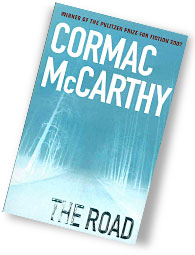FEATURE ARTICLE -
Book Reviews, Issue 38: Nov 2009
By Cormac McCarthy
Published by Picador1
Reviewed by Stephen J. Keim
The Road is a little book. My Picador edition has 307 pages but the pages are small; the writing is big; and with plenty of dialogue, space rather than words predominate on many pages.
It is also a sparse book. The plot is simple. A man and his son, a young boy, move day by day through a burned landscape. They are moving south for warmer weather. They are also following a river valley to the sea. They walk the road by day. They find shelter at night where they can. They fossick for food and other things of use in abandoned houses and old service stations. Running out of food for the last time is, continually, a matter of just days away.
The fires continue to leave their mark. There is ash on the wind. There is ash in the river and in the sea. There is ash everywhere. The snow in the mountains is grey.
There once was a woman as well. She left them, one evening, to take her own life with the sharp edge of a piece of obsidian. She could take the uncertainty, no longer. Or, rather, she could take the certainty, no longer, that they were just putting off, by their struggle for subsistence, an even more horrible end.
The cause of the apocalypse, other than that it involved fire, is not explained. Most people and most living things have died. The evidence of the dead is everywhere, not only in the abandoned houses and empty cities, but also in the form of bodies, variously decayed or in some form of mummified preservation. The narration, through the silent recollections of the man, gives some idea of the way in which society broke down, how groups formed and preyed upon the weak.
The boy has no knowledge of a time before this. When his father tells stories of his own childhood, of the time before, they are fantastical to the boy, like stories from Grimm or Andersen.
In a world where few people remain alive, every other person is an enemy to be avoided. Even as his health declines, the father knows that his only reason for existence is to protect the boy. He must remain alert at all times. They have a shopping trolley in which they wheel their possessions. They have their most valuable possessions in two rucksacks in case they must abandon the trolley and flee at any time. The man knows that, when he can live for no longer, his duty will be to make sure that he does not leave his son unprotected in this threatening world.
Seinfeld is said to be a show in which nothing happens. The Road is truly where nothing happens. Nothing can diminish the threat that is always around the next bend in the road. Even a piece of luck, like the discovery of a plentiful source of stored food, only increases the foreboding for the characters — and for the reader.
The Picador paper back edition reproduces a series of favourable reviews. Adam Mars-Jones, writing in the Spectator, marvels at the “poetic description of landscapes from which the possibility of poetry would seem to have been stripped”. There is no doubt that the quality of the prose and the images it depicts constitute an extraordinary achievement.
Even more impressive is the emotional landscape projected upon the canvas of a burnt out world. The boy and the man need to be reassured that they are the good guys (and that they “carry the fire”) even when survival appears to have replaced all other values. It is the boy who reminds his father of the importance of their claim to virtue. It is he who, with nothing more than a look or silence, shames his father into sharing with those who they encounter upon the road who are no threat and who have even fewer possessions than the two. It is he who questions his father’s frightful retribution upon one who would have killed and robbed them both.
Cormac McCarthy was born in 1933.2 He has published ten novels including No Country for Old Men, which was adapted as a film in 2007. The Road won the 2007 Pulitzer Prize for fiction.3 This Pulitzer is one of many awards that McCarthy has won over his long and distinguished career. Critic, Harold Bloom,4 ranks him as one of the four leading American novelists of his time.5
However, The Road also caused McCarthy to be included in the Guardian’s list of fifty people most likely to save the planet.6 The nomination came from journalist and writer, George Monbiot (himself on most people’s lists of climate change and environment heroes), who said:
“It could be the most important environmental book ever. It is a thought experiment that imagines a world without a biosphere, and shows that everything we value depends on the ecosystem.”
As Monbiot himself notes, it is The Road’s aesthetic qualities which give it its polemic power. The descriptions of the book and its action by this reviewer, at the end of the day, give a false picture of The Road. It is a much more wonderful and enchanting book than the bleakness of its subject matter would suggest. The reader becomes riveted to the struggle that unfolds from page to page. Hope flickers amongst the foreboding when there should be nought but despair. The man and the boy are at the end of the earth. We feel that we must go with them — every step of the way.
Stephen Keim
Footnotes
- Picador is an imprint of Pan Macmillan Ltd. The Road was first published by various divisions of Random House.
- http://en.wikipedia.org/wiki/Cormac_McCarthy.
- http://www.pulitzer.org/citation/2007-Fiction.
- http://en.wikipedia.org/wiki/Harold_Bloom.
- Along with Thomas Pynchon, Don DeLillo and Philip Roth.
- http://www.guardian.co.uk/environment/2008/jan/05/activists.ethicalliving.



